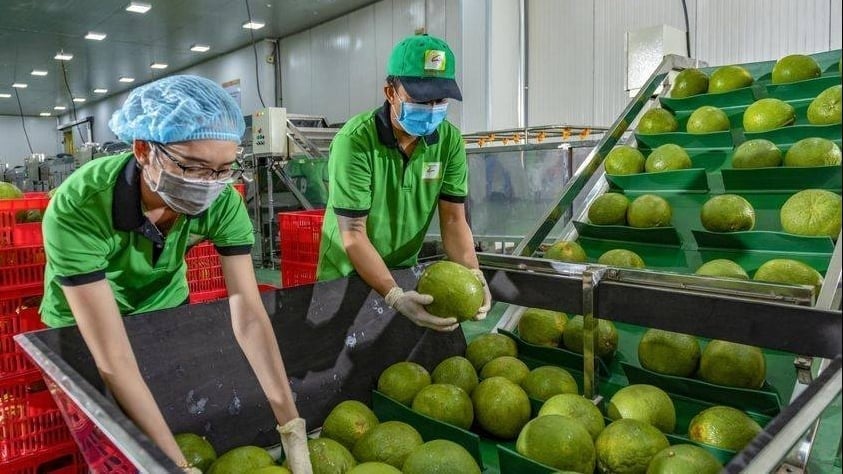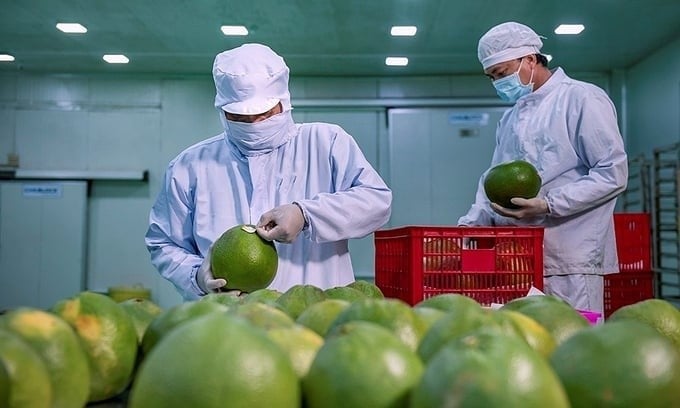November 26, 2025 | 19:37 GMT +7
November 26, 2025 | 19:37 GMT +7
Hotline: 0913.378.918
November 26, 2025 | 19:37 GMT +7
Hotline: 0913.378.918
This is the information that Dr. Ngo Xuan Nam, Deputy Director of the Vietnam SPS Office, shared with Vietnam Agriculture and Nature Newspaper on the evening of May 7. Official dispatch No. 88/SPS-BNNMT has been sent to the Plant Production and Protection Department to implement the next steps in exporting fresh Vietnamese pomelos to the Australian market.

Vietnamese pomelos are ready for official export to Australia.
Australia's Department of Agriculture, Fisheries and Forestry (DAFF) has officially released the Final Report on Biosecurity Import Requirements for Fresh Pomelo from Vietnam, affirming that Vietnamese pomelos are eligible for import into Australia, provided all phytosanitary and pest control measures are fully implemented.
The report confirms that Australia has completed its risk assessment of the entire process of production, harvesting, post-harvest handling, and transportation of pomelos from all commercial growing regions in Vietnam. Through this assessment, DAFF identified 19 pests requiring risk management measures to ensure biosecurity. Notable among them are the Asian citrus psyllid (Diaphorina citri), Oriental fruit fly (Bactrocera dorsalis), mealybugs, and spider mites, all of which have previously impacted citrus crops in many countries.
To safeguard Australia's ecosystems and indigenous agriculture, Australia recommends control measures such as sourcing from growing areas or production facilities certified as Pest-Free Areas (PFAs), treatments with irradiation or Methyl Bromide, and pre-export visual inspections.
For citrus canker, the Australian side requires a "systems approach," including an integrated measure chain from the orchard to post-harvest treatment.
Beyond technical evaluations, the Australian side also consulted with seven organizations and individuals at home and abroad before completing the final report. Adjustments of production information, pest management, and new data updates are all incorporated into the April 2025 report.
Notably, Australia's quarantine authority highlighted that three pest species listed above, such as mealybugs and spider mites, are subject to regional quarantine in Western Australia. Therefore, although Vietnamese pomelos are allowed for import into Australia, pomelo products still need to comply with separate regulations when transported across states.

Vietnamese pomelo varieties such as Nam Roi, Da Xanh, Dien, and Tan Lac are currently exported to many markets with high technical requirements like the U.S., the EU, Canada, and Japan.
Australia’s recognition of Vietnam's capacity to meet biosecurity standards opens up a significant opportunity for the Vietnamese pomelo industry. According to the Ministry of Agriculture and Environment, Vietnam’s pomelo-growing area has doubled in the past five years, from 50,000 hectares in 2015 to over 100,000 hectares, with an output of nearly 1 million tons. Production is mainly concentrated in the Mekong Delta, Red River Delta, and Northern Midlands and Mountainous Region.
Vietnamese pomelo varieties such as Nam Roi, Da Xanh, Dien, and Tan Lac are currently exported to many markets with high technical requirements like the U.S., the EU, Canada, and Japan. However, annual export volumes remain modest, around 5,000 tons, mainly due to limitations in technical standards and post-harvest preservation technology. Market access to Australia will offer Vietnamese pomelos an opportunity for sustainable growth.
As planned, following the publication of the report, Australia will proceed with final verifications with Vietnam to ensure the country's capacity to implement required quarantine measures. Once the verifications are completed, official import conditions will be published on Australia's Biosecurity Import Conditions (BICON) system, the import conditions database for plants and plant products.
The completion of this report not only marks a step forward in market-opening negotiations but also demonstrates the growing competence of Vietnam’s crop production and plant protection sectors in meeting stringent international biosecurity requirements.
Full report available HERE
The official opening of the Australian market for fresh Vietnamese pomelos marks a significant milestone in Vietnam's efforts to diversify export markets for its high-potential fruit sector. It reflects not only the country's improved capacity in meeting international biosecurity and quarantine requirements but also signals a new phase of sustainable growth for the pomelo industry.
As of now, Vietnamese pomelos have been licensed for official export to 13 countries and territories. The majority of export volume goes to China, accounting for over 50% of total export turnover. The next largest markets are the U.S. and South Korea. In addition, Vietnamese pomelos have appeared in markets such as Canada, New Zealand, Germany, the Netherlands, the UAE, Hong Kong, and Norway.
Translated by Thu Huyen

(VAN) China’s cooking oil is suddenly flooding into India. It all comes down to a soybean surplus that Beijing doesn’t quite know what to do with.

(VAN) An Giang promotes supply-demand connections, standardizes quality and builds value chains, creating a foundation for sustainable bird’s nest development and aiming to expand exports.
/2025/11/24/5339-4-nongnghiep-075331.jpg)
(VAN) Recently, the conference on 'Sustainable Fisheries Linkage Chain - Tilapia for Export' took place in Tien Hai commune, Hung Yen province.
/2025/11/21/4309-2-153400_128.jpg)
(VAN) Green and low-emission rice is paving the way for Vietnamese rice to enter high-end markets, marking the beginning of a transformation journey toward greening and elevating the national rice brand.

(VAN) ‘Right to Win’ outlines a national action plan that shapes a new vision for Viet Nam’s agriculture in an era of renewal and global integration.

(VAN) Lam Dong’s farmed sturgeon output this year is expected to reach 2,300 tons, worth VND 450 billion, affirming the brand’s position on the market.

(VAN) A surge in Ukrainian egg exports, largely driven by soaring sales to the UK over the last few years, has notably pushed up egg prices on the domestic market.